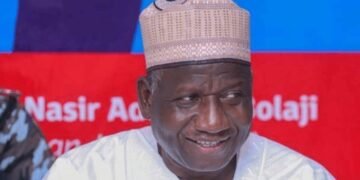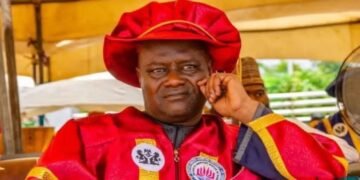Sir ,of what impact is the title of Areonkakanfo to Yoruba race.?
The Areonakakanfo have a very significant role to play in the security and propagation of the strength of the Yoruba race.. At the time when Oyo Empire was the Headquarter of the Yoruba political and economical power, the Alafin was the ruler of the empire. The Aare onakakanfo was the chief of the Army staff for the empire during the Yoruba fratricidal wars and confrontation with the Fulanis. The Oyo Empire was one of the most powerful and popular empire in West Africa at the time. The extract below from my book “The Cradle of Yoruba Culture” can shed a little light on the role of AAre ona kakanfo in ancient Yoruba land
Yorùbá fratricidal wars and the Ọ̀yọ́ Empire.
Alaafin Oyo Kingdom. Alayeluwa, Oba (Dr) Lamidi Olayiwola Adeyemi 111 Several Yorùbá towns were founded as a result of a series of civil wars among the Yorùbaś. Oral tradition in Ife said that Ọ̀raǹmíyaǹ, the last son of Odùduwa,̀ who was already a great warrior, decided to venture for his own territories in approximately the fifteenth century. The Ọ̀yọ́ Empire began around the end of the fifteenth century. After the Arabs, the Portuguese were the first Europeans who made contact with the Africans. One of the names that rings a bell is Alfonso. They traded guns and gunpowder among the tribes. At one point, civil war broke out among the ethnics. As part of the nature of war, villages were looted and people were captured, slaves were traded for guns, mirrors, alcohols, beads and other items. It later led to massive slave trades and migration of millions of Yoruba to the Americas. The Ọ̀yọ́ kingdom expanded as they were able to acquire more guns and horses from the Arabs and the Portuguese. The wars led to the emergence of factions. One the factions led by Àfoǹjá sought alliance with the Fulani mercenaries under the leadership of one Alimi. Àfoǹjáwas betrayed by Alimi. The alliance of Àfọǹjá and Alimi led to the destruction of Ọyọ́ Empire and the creation of many Yorùbá city states like Ìbàdaǹ, Ògbó̰mọ̀ṣọ́, Òṣogbo, Ede and many other towns.
The following are the names of the Kings who ruled the Ọ̀yọ̀ kingdom before Aólẹ̀: Ọ̀raǹmíyaǹ, Àjùwọń, Ṣaǹgó, Aganju, Kori, Olú àso, Oni igbo gi, Ọ̀fìraǹ, Egugu oju, Ọrọnpọtọ, Ajíbóyèdé, Abipa, Ọba lokun a gọn, Erin, Ajagbo Odarawu, Karon, Jayin, Ayibi, Ọsinyago, Ojigi, Gberu, Amuni wa’ye, Onisile, Labisi, Awon bi Ojú, Agbólúajé, Maje o gbe, and Abíọ́duń.
In about 1810, Arógangan Aolẹ succeeded Abiodun. Àfoǹjá the Àrẹ ọ̀nàKakaǹfò (The head of the Army) of Ilọrin rebel against Alafin Aolẹ. He refused to come back to Ọ̀yọ́ as a subject of Aláàfin. Aólẹ̀ sent warriors to go bring him. He knew he could not confront the warriors of Alaafin; he in turn asked for the help of the Fulanis. Alimi was a Muslim in Imam at the time in Ilọrin. He asked him to help contact the Fulani for help. The Fulanis came and helped Àfoǹjá conquered the Ọ̀yọ́ warriors. Alimi made a deal with Àfoǹjá that if he would help him get the Fulani to conquer Alafin’s army, his children could continue to live in Ilorin. Afọnja dismissed his own armies. The Fulanis won, claimed the throne and took the power away from Afọnja. Àfọǹjá was later killed in a street fight in Ọ̀yọ́. Since that time, the throne of Ilọrin has been controversial. By 1817, Ilorin became independent from Ọ̀yọ́. Alaafin Aólẹ̀ poisoned himself and died and the palace in Ọ̀yọ́ was raided. Many people fled to establish other neighboring towns like Òṣogbo, Ògbómọ̀ṣọ́ and so on. That was the beginning of the disruption of the Yorùbá kingdoms and the Ọ̀yọ ́Empire. Since then, the descendants of Alimi and the Fulani fight to be King or Emirs in Ilọrin. The common slogan by the Yoruba at the time was “Laye Abiodun a roju sise. Laye Arogangan lo polo gbode” during the reign of Abiodun people could go to work. In the times of Arogangan Oba Aole, the frogs took over the towns.
Here is the time line of some of the fratricidal wars fought among the Yorùbás after the disruption of Ọ̀yọ́ Empire:
The Batedo war between Ijaye and Ibadan in 1844 (Johnson 297-310).
Ìjàyè war went on until 1862. It was finally won by Ìbàdaǹ.
Ìjẹ̀bú ere war took place from 1850 to 1851. At the time that Olúyọ̀lé died and Modákẹ́kẹ was established (Johnson 317-320), the supporters of Ijaye Ijẹbu and the Ẹ̀gbás ganged up against Ibadan and defeated Òguńmọĺá the Balógun of Ìbàdaǹ (the commander in chief of the army). In 1664 the Ẹ̀gbás attacked Ìkòròdú. The British attacked because they wanted to take advantage of the situation. The Ẹ̀gbás fled Ikorodu; they were then attacked by Sódẹkẹ́ and his army from Ibadan. A resolution to end the war was finally made between Ẹgba and Ibadan in 1865.
Ibadan defeated the Ìjẹ̀ṣà who had occupied Igbajọ town. Ọwá Obòkun of Ijeṣa surrendered, and Iléṣà was captured by Ibadan in 1870. Because Ilé Ifẹ̀ was regarded as the cradle and spiritual base of the Yorùbá, they never took the war to Ifẹ̀. Ifẹ̀ remained a neutral zone immune to the war and it became a refuge for the Yorùbás. That was how Modákéké was established before it was later ordered to be evacuated.
It was said that there were several towns that were founded by Ọbàlùfọn,̀ the third Ọọni of If̀ẹ̀. During this time other towns were founded by the Ìjẹ̀ṣà when the Ọwá Obòkun of Ìjèṣà decide to expand his territories around 1760 in the Ijẹ̀ṣà arara war. Towns like Òkukù and Ìkìrun were founded. (Johnson page 259)
Some Yorùbá towns were also founded by some fugitives from the Tapa tribe in the Pamọn War. When the Tóyèse, then the Kakanfo (a military title) of Ògbómọ̀ṣọ́ asked for help from Abdusalami, one of the grandchildren of Danfodio who took over Ilorin. Before then, Ògbómọ̀ṣọ́ had been subordinate to Ọ̀yọ́ empire. It led to the invasion by the Fulani to as far as Òṣogbo. When the Fulani invaded Òṣogbo in 1843, Olóyọ̀lé came from Ibadan and helped them drove out the Fulanis. After that, Òṣogbo was subjected to Ibadan. These wars led to the destruction of Ọ̀yọ́ Ilé (the old Ọyọ Empire).
Here is a time line of some of the Yoruba fratricidal war:
In about 1820, the Fulani conquered Ilorin. Abdul Salami became the first Emir of Ilọrin. Ọ̀yọ́became tributary tò war. Olúyọ̀le became Baṣọ̀run to Alaafin Àtìbà.
1850–1851 Ijebu ere war (Johnson 316-321)
Batedo war 1844 between Ìbàdaǹ and Ìjàyè
1860–1862 Ìjàyè war between Ìbàdaǹ and Ìjàyè. Ìbàdaǹ won in 1862.
In 1864 Òguńmọ́lá Balógun of Ìbàdaǹ was defeated and the Ẹ̀gbàs attacked Ìkòròdú. Ìkòròdúasked for the help of the British government. Ṣódẹkẹ́ attacked the Ẹgbas.
In 1665 an agreement was signed between Ìbàdaǹ and Ẹ̀gbádo to make peace.
In 1867 the Ìbàdaǹ defeated the Ìjẹ̀ṣà and Ọwá Obòkun surrendered.
In 1870 Ileṣa was captured by Ìbàdaǹ.
In 1878 Jalami war. Èkìtì Ìjèṣà and Ilorin attacked Ikirun. Ibadan drove them out.
In 1880 Kiriji war. Ẹgba and Ijebu were raiding the borders of Ìbàdaǹ.
By this time, the Ọ̀yọ́ Empire had been weakened. War went on between Ìbàdaǹ and Ilọrin. Through intervention of the government, a peaceful agreement was reached. It was planned that Ìgbájọ would belong to Ìbàdaǹ. Modákẹ́kẹ́ was to be evacuated. Anyone who wanted to be with Ìbàdaǹ would build a new town, and anyone who wanted to be with Ilé If̀ẹ̀ would stay in Ifẹ̀ towns.
In 1889 a treaty was signed between the British Government and Adéyẹmí (the Alaafin Ọ̀yọ́) to allow free trade between the towns. At that time, the French protectorate of Dahomey had been laying claims to some territories along the coastline of Lagos. The British decided to act quickly.
In 1893 treaties were made between Ọ̀yọ́ ̀Ibàdaǹ and others. The order to evacuate Modákẹ́kẹ́ was never obeyed. The British tried successfully to dismantle the war camps at Ìbàdaǹ, Ikirun and Ilorin.
In 1897 Ilọrin and Bidah, which were raided for slaves, were captured by the Royal Niger Company, which was already taking control of the territories. Tapa Nupe and Ilorin were warned against continuous slave trading and they later accepted the control of the Royal Niger Company. In 1901 the Yorùbá land became attached to the colony of Lagos under the British and Royal Niger Company. The Yorùbá land was eventually colonized by the British under an indirect ruling system that emulated the similar system of Yorùbá governance in the 1901s.
In the modern world, do you think we still need such title.? If yes why?
Yes . I think the Yoruba must still maintain the tradition. It is a title that is unique to the Yoruba. The Areonakakanfo was the overseer of the Yoruba interest in terms of the development and expansion of the empire. Oyo empire had expanded beyond Oyo town to cover all the Yoruba race including the Yoruba ancestors that have migrated to the new world, the Americas and Caribean Island during slavery. Many of those descendants are looking forward to coming back to the Yoruba land like the Jews went back to Jerusalem . Part of the reason why the Yoruba today are weak in terms of infrastructure and not benefiting from the new era is because Yoruba failed to maintain a lot of her traditional values. MKO Abiola who was the last Areonakakanfo was not giving the chance. Today Yoruba need direction and strong leaderships and no one will do it for the Yoruba but themselves. Yoruba today are being marginalized and sometimes discriminated against by the other tribes in Nigeria. Yoruba are the least beneficiaries of the infrastructural development in Nigeria. We want no more wars but we need unity and development. Yoruba have vast farm land and great resources but no development since the Cocoa house was built during regional government of the 6os. Its about time we wake up and put an end to the harassment of the Yoruba by other tribes in Nigeria. Lets keep Nigeria one. The only way that will happen is if there is fairness and mutual respect among all tribes without divisions.
Otunba Gani Adams has just been appointed as the Areonakakanfo of the Yoruba land. Do you think he deserve the title ? Justify your position.
Yes in my honest opinion I think he deserve it because he have demonstrated passions and care for the Yoruba interest in times of troubles and disturbances .The Yoruba must take peace initiatives and security of the people and their properties seriously otherwise we may loose our position in the world. Gani Adam selection by Alaafin Oyo was a genuine and smart elderly choice. Gani is a young energetic and affluent person. He has demonstrated fearlessness and bravery in times of crisis anywhere in Yoruba land by making his voice heard. Areokakanfo should not just be an honorary title .It was never was in the olden days. It was for valiant warriors. Even though we are not in physical war but we are in physiological war even among ourselves Yorubas. Yoruba need to wake up.
As a custodian of Yoruba tradition and culture in the United State, how far have you gone in projecting Yoruba Culture and Tradition to the advanced society.?
Araba. I and my board have established Institute of Yoruba Cultural studies and International Foundation for Ifa Temples Inc. in America and the Caribbean Island where we teach and exhibit the heritage of Yoruba people across the world.
Do you think Ifa has any solution to the economic and socio problem in Yoruba land
Yes Ifa has solution to the economic the socio problem in Yoruba land if only we can consult reputable Babalawos like Araba of Oshogbo Chief Ifayemi Eleburuibon, Awise Prof Wande Abimbola and host of others Babalawos to make divination and find out what we should do to reverse the curse of Alafin Aole on the Yoruba people when he was betrayed by one of the Areonlakanfo by the name Afonja of his time as the Alaafin Oyo. There are several Odu of Ifa that have predicted why we will loose our grounds, if we fail to listen to the guidance of our traditional values Odu Ifa such as Ogbeka ,and Ogbedi that speak about restructuring ourselves and mending the broken world. After all most of the towns in Yoruba land were establish through the guidance of Ifa. .For example Odu Osemeji was the Odu our ancestors used the established Ibadan .that is the reason why Ibadan continue to expand beyound its original boundaries. So also Idi Irete was the Odu that the founder of Oshogbo receives from consulting Ifa to establish Oshogbo which is why the town continues to thrive. The Odu that established Ejigbo was Ejiogbe. So were many other towns in the Yoruba land waere established by consulting Ifa in the olden days. Now we need to look back to where we were coming from and engage those ancient ways among other things. As we can see that other race of people like Chinese that embraces their culture and tradition continue to excel in everyway.
Do you have any program or cultural projects in view?. Tell us and let us know your preparation towards the success of the event including the dignitaries expecting to grace the occasion.
The Institute of Yoruba cultural studies in collaboration with the other Institutions do Cultural events twice a year. We are doing one in May and the other one in October. I expect to invite The OOni of Ife Arole Oduduwa and some other Obas in May to Atlanta. Otunba Gani Adams the Areonakakanfo of Yoruba land will also be invited as well as many other artists from Nigeria and the Diaspora. We will keep you posted. Positive suggestions are welcome. Thanks.













